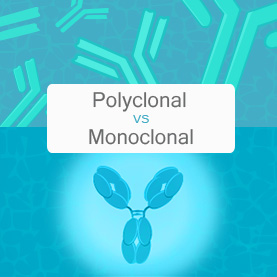Hello, Sign in
My Account
My Account
New customer? Start here

Monoclonal or Polyclonal?
The decision of whether a monoclonal or polyclonal antibody is more suitable for a specific research application is determined by a number of factors, and involves comparing the respective attributes of these two kinds of antibodies in light of experimental conditions and demands. In general, monoclonals provide higher specificity while polyclonals provide higher sensitivity. For applications such as Western blotting and immunoprecipitation, polyclonal antibodies often provide a stronger signal. Monoclonals, on the other hand, generally exhibit lower non-specific binding and lower cross-reactivity with other proteins. Once a hybridoma line has been established, monoclonals can be produced in theoretically unlimited quantities. They do, however, require a more complex and lengthy development process than polyclonals.
What is a Polyclonal Antibody?
The term Polyclonal Antibody refers to mixture of antibodies, each produced from different B cells. This is the product of the natural process of exposing a foreign antigen to the immune system of a living organism. The collection of antibodies recognizes multiple epitopes on the same antigen, ensuring efficient capture of the target. Each of the individual antibodies in a polyclonal antibody recognizes a unique epitope that is located on that antigen.
What is a Monoclonal Antibody?
By way of contrast to polyclonal antibodies, production of a monoclonal ready for reagent use is not a natural process, but rather entails an in vitro laboratory procedure whereby the desired B-cell is isolated from an animal and fused to an immortal hybridoma cell line so that large quantities of identical antibody can be generated.
| Monoclonal | Polyclonal |
|---|---|
| Highly Specific—recognizes one epitope | Highly sensitive—allows detection of very small quantities of antigen |
| Lower likelihood of species cross-reactivity than with polyclonal | Higher likelihood of species cross-reactivity |
| Screening of hybridomas allows selection of different antibodies against one antigen | Lower cost and shorter production time than monoclonal |
| Generally greater batch-to-batch consistency than polyclonal | Frequently higher signal strength than monoclonal |
| Production of unlimited quantities of identical antibodies from immortalized hybridoma lines | Limited to serum output of a single animal. Larger animals will produce more antibody in a lifetime |
For diagnostic and therapeutic applications that demand large volumes of identical antibody specific to a single epitope, monoclonal antibodies are the overwhelmingly preferred option. For general research applications, however, the advantages of polyclonal antibodies often provide the most economical and practical solution.